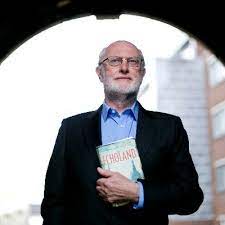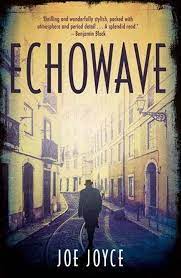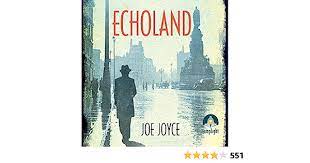Echoland (2013) by Joe Joyce
GoodReads meta-data is 352 pages, rated 3.72 by 458 litizens.
Genre: Krimi
DNA: Ireland.
Verdict: More, please.
Tagline: High heels on cobble stones?

A krimi set it in Dublin during May and June 1940, sprinkled with Gaelic and the manners and morēs of rural Erin. A desperate Britain might be driven to occupy the Free State to preempt a German advance. That would start with seizing the western ports and airfields as enclaves for the Battle of the Atlantic, and once ensconced, expansion to the hinterlands would follow all the way to Dublin. Or the Germans, already using Ireland as a base for spies, might target the western ports for its U-Boats. That seems dangerous enough but there is also the irreconcilable IRA within looking for German allies to unite the island on the principle that my enemy’s enemy is my friend. Meanwhile, the parliamentary government with a thin majority and thinner legitimacy sticks to neutrality in word and deed, while preparing for both eventualities.
Into this minefield steps a junior army officer who reads some German and because of that is transferred to Army intelligence and set to work spying on the spies both German and British and later American. There are some nice twists and turns and the characters are several and varied. There is much of the time and place, the bicycle as transportation, the ubiquitous cigarettes, the invisible hand of Catholicism in hospitals and schools, the furnishings and dress, the smells and sounds of the city, but the descriptions of these backdrops are spare and do not deflect or delay the narrative. By and large the author’s touch is light but firm and clear.
The officer is a country boy new to the ways of the big city, and stumbles around. But he is good at finding threads in the files of reports, and questions the obvious that others have looked through. Moreover, his knowledge of German is better than that of many others in the office, and they turn to him for help in translation, which enlightens him further about the bigger picture.
There is no explanation of the title that I noticed, and note well that the title used by three or four other authors. Nor is there an explanation of why and how he learned German.

I liked it enough to go onto the second in the series, and the third.

Above, I said that the characters are varied, and when I started another similar book, I was reminded of the importance of that variation. In this other, unnamed book, every character in the Kindle sample uses the same words, idioms, and register, like one of those plays where one actor does all the parts, changing costume but nothing else.

